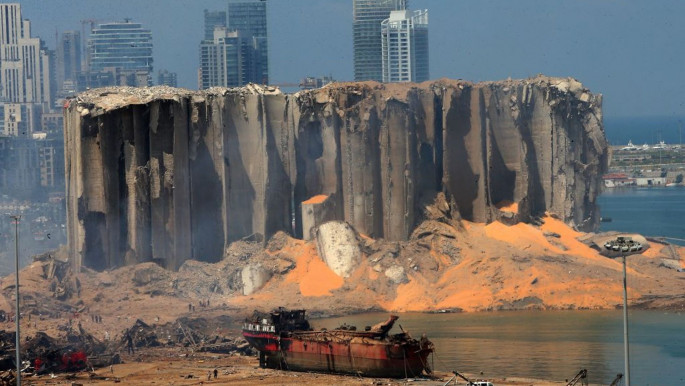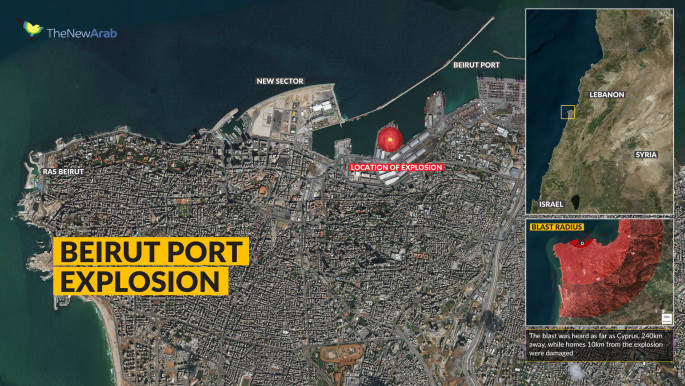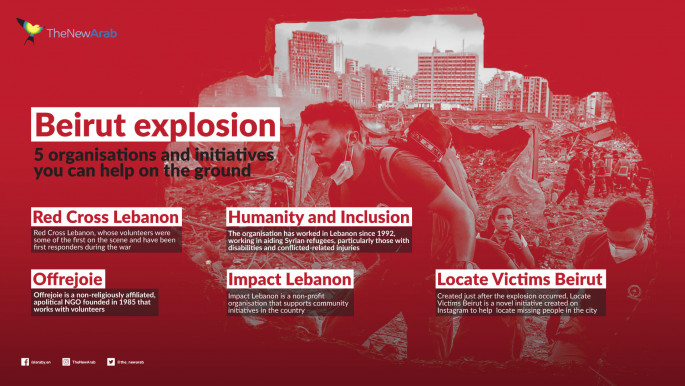Follow us on Facebook, Twitter and Instagram to stay connected
Impact Lebanon: How a former WhatsApp group evolved into leading the global appeal for Beirut
As the political elite point fingers of blame, aid groups stepped up to help Lebanon during this time. Impact Lebanon is one of them.
7 min read
Beirut is in pieces [Getty]
Captured live and seen by millions globally, the cataclysmic explosion of hundreds of tonnes of ammonium nitrate in Beirut’s port on 4 August 2020 devastated Lebanon's capital city and caused a shockwave around the world, mobilising thousands in the vast Lebanese diaspora to rush to the aid of their homeland.
Over 170 people were killed in the blast, thousands were injured, and 300,000 people were made homeless overnight. Billions of dollars in damages were caused and decades-old cultural monuments, galleries, and businesses were obliterated in seconds.
Diana Abbas, a Lebanese community organiser in London, was one of thousands in the Lebanese Diaspora who watched the explosion with utter horror far from Beirut.
Abbas is a co-founder of Impact Lebanon, a previously little known organisation that has quickly mobilised to lead the overseas appeal for aid to Lebanon. Minutes after the blast, Impact Lebanon set up a JustGiving page which raised nearly £5 million in one day.
Starting off as an informal WhatsApp group for Lebanese people visiting London, Impact Lebanon eventually evolved to organising demonstrations in support of anti-government protests that swept Lebanon in October.
“We started the Justgiving page with a target of £10,000,” Abbas told The New Arab. The 160-odd member organisation, made up of volunteers, saw the explosion and its members were some of the first to respond to the tragedy.
As of the writing of this article, £5,816,666 of £7,500,000 has been raised, and it is the most money the organisation has ever raised.
“It’s so, so overwhelming because of the people who have shared [and] the support…first of all it started with friends of Impact Lebanon that we already have on social media and partner organisations. Then it moved to Lebanese influencers. Then it became international celebrities. It was crazy to see them share our Impact Lebanon fund and going to see that our fundraiser is on their Instagram profiles.”
Even before the blast, Lebanon was cracking under the weight of corruption, hyper inflation, food shortages and for many, an inability to withdraw their own money from banks due to an ongoing banking crisis.
And then in one afternoon, half of Beirut was destroyed.
The political elite floundered in its response, scrambling to shift the blame onto one another until eventually, under local and international pressure, Lebanese premier Hassan Diab announced the resignation of the government. Many in Lebanon blame the authorities which seem to have known for years the presence of unsafe stocks of ammonium nitrate close to residential and commercial neighbourhoods yet did nothing.
The authorities launched an investigation and detained over a dozen port officials, but the Lebanese want higher-ups to be held accountable and some are demanding an international inquiry amid distrust in the government. Meanwhile, the state has been late to assist in the clean up and rescue efforts, leaving volunteer-based organisations and initiatives to lead the response.
Impact Lebanon's simple beginnings
Following protests in Lebanon in October last year, a member of the London WhatsApp group, a largely social enterprise, suggested they do something too in solidarity with the Lebanese protests.
 |
| The explosion destroyed half of Beirut [Getty] |
“One person called the police to notify them that we will be having a protest. One person designed the poster, one person volunteered for us to meet at her home – even though none of us had met each other.
“We started these WhatsApp groups, we thought that would be the best way to broadcast details about the protest. We didn’t’ have a Facebook page, we didn’t have an email address, we didn’t have anything.
“We shared [the WhatsApp groups] all over social media, and they went viral as people started joining them. We reached the capacity of four WhatsApp groups at the time.
“Around 2,000-3,000 people showed up to the protest" in London.
Less than a year later and Impact Lebanon has a website, a pledge, fundraising initiatives; it hosts seminars about issues effecting Lebanon, webinars, engages in lobbying efforts to support the people of Lebanon and launched a host of initiatives targeting Lebanon, including Lebanon Corruption Facts and the Lebanese Revolution 2019 website.
With a board of directors – including one based in Lebanon – drafted by-laws and a decentralised approach to initiatives, the organisation's representatives say it is underpinned by a fierce dedication to accountability and transparency – two virtues missing in those that govern Lebanon today.
Transparency first
Speaking of the Beirut explosion fund, Abbas emphasised the importance of keeping the 164,366 who donated so far fully informed.
“Our priorities are healthcare, food and shelter provision,” she said.
“Based on these priorities we go through a list of NGOs, and we qualify these NGOs: We make sure they are 1) A registered, local NGO in Lebanon, 2) We make sure they are apolitical and a-sectarian, 3) That they have ongoing or planned initiatives that address the ongoing crisis related to the Beirut explosions, 4) Checking if they previously passed an audit test, we require nine to twelve documents from them to confirm for due diligence. And then we evaluate their proposal.”
 |
| Click on the image to be taken to the Impact Lebanon website [screengrab] |
“So far we have allocated $133,000 to Red Cross Lebanon; the second NGO is Arcenciel, $200,000 to them and the third is Beit El Baraka and we will be donating $160,000 to them,” Abbas revealed.
“We have two NGOs in the pipeline that are pending documentation – signing the memorandum of understanding (MLU).”
“As soon as an MLU is signed, we immediately release the name of the NGO, the amount that’s going and then once we transfer the money, we will be sharing clearly the invoice or proof of transfer [on our website] to make sure we are being completely transparent.”
She added that they are currently in the process of vetting over 50 NGOs – a number likely to grow.
Bank transfer challenges
Abbas has anticipated that one of the biggest challenges for Impact Lebanon is delivering money to organisations in the country, given the financial difficulties offset by a bank crisis which makes withdrawal of funds hard.
“We are partnering with a number of non-profit organisations that have bank accounts in England and Lebanon, the British Lebanese Association for example, that will help us donate the money,” Abbas said.
“We also have a partnership with a newspaper, L'orient le Jour. They have a bank account in Lebanon.
“Given the banking restrictions, for the most part these funds will be transferred to a 'fresh dollar' account [i.e. non-subject to capital controls], either one of our partners’ fresh dollar accounts in Lebanon, so they will transfer the money from here to there, or directly to the fresh dollar account of the NGOs.”
 |
| The city suffered critically [TNA] |
“[Fresh dollar accounts] is a funny concept created in Lebanon,” Abbas added. “Basically they create new accounts so if money is coming from abroad – new money - they are allowed to withdraw it all" in USD
Hope and resilience
The explosion triggered widespread anger across the country and a weekend of anti-government protests followed as people demanded the government take responsibility for the tragedy.
“The Lebanese people have been suffering for years from this mismanagement and no support from the government of its people, and the heavy reliance on the NGO sector because the government hasn’t been fulfilling its duties,” Abbas said.
“And then the banking crisis happened, and people were unable to withdraw their hard-earned money, and so many people lost their livelihood, and there was such a struggle.”
“And then covid-19 happened. This effected people’s livelihoods as well. And the inflation. People can’t even access their money in the first place.
Read more: Beirut Explosion: Be angry, not just sad, for Lebanon
“And then something like this happens! Something this huge, that’s turned into an international humanitarian crisis where people literally lost their homes, and they were already struggling.”
“We don’t know the facts, and I think it’s really important for us to be diligent in understanding and listening to facts and reaching fact-based conclusions. An independent investigation needs to happen.”
And yet despite Lebanon’s newest wound, there remains a burning belief that the explosion, like so many other tragedies in the country’s history, will not break the people of Lebanon.
“Beirut is what it is because of its people, the people that made it thrive and bustle with life and culture and the people who have mobilised and are now clearing the rubble and rebuilding it,” Abbas said.
“Seeing Beirut destroyed is devastating, but its people give me hope that it will be rebuilt even stronger.”
 |





 Follow the Middle East's top stories in English at The New Arab on Google News
Follow the Middle East's top stories in English at The New Arab on Google News


